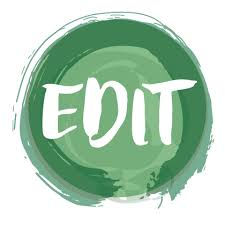11 Tricks to Kick Your Worst Author Habits
- Author Bruce Shields

- Feb 19, 2021
- 5 min read

Procrastination
Procrastination can sometimes be confused with a lack of inspiration. I blogged before about inspiration being the fuel for an artist, and I have not changed my mind on that. Procrastination is the beast of laziness. It is disguising itself as writer's block or another obstacle keeping you from creativity.
The trick to overcoming procrastination for me is writing every day, if even for twenty minutes. It usually turns into a more extended session, opens the doors to creativity, and allows me to work on my project every day. If I'm not "feeling it," I write anyway, something light-hearted like a blog post or social media posts. If it's procrastination, it usually subsides, and I can get back to my manuscript. If I lack inspiration, well, that's another blog linked at the bottom of this one!

Editing before finished
Because I have dyslexia, when I finish typing a page on the computer, it looks like a Christmas tree with all the red lines under misspelled words. It accomplishes its design and what we were programmed from an early age to respond to, the red-pen of correction.
However, when you repeatedly stop to correct paragraph after paragraph, you break the flow of your thought and creativity. It would be best if you waited until after you finish writing to correct and re-write.
My answer for this is, I turn off the auto-correct or, in my case Grammarly, to work uninterrupted. There's always time to correct later, don't ruin your creative juice flow!
Too many exclamation marks
Have you ever had a friend who sends you a text, and it's all in caps? You think, sheesh, why are you yelling? However, they aren't. For some reason, that's just how they type messages.
That's how too many exclamation points can be for the reader. It's an easy trap to fall into, especially when you have characters arguing in a heated debate. However, the exclamation point can lose its power if overused, like the boy who cried wolf.
Try using them sparingly. Instead, describe how the characters look and feel in between the heated exchange of dialog, this will paint the picture inside the reader's head, and the need for exclamation points will lessen.
Very long paragraphs
When I first started writing stories in elementary, you would be lucky if a complete page of the text had a single paragraph. Add in my yet diagnosed dyslexia, and the page looked like someone dropped a game of scrabble on the floor.
Remember to break up your text into manageable paragraphs, so your readers don't have to work too hard on reading; this goes along with writing at junior high levels and not using technical terms or big words readers have to go lookup.
Why? Because you want the reader to use their brains on your storyline and not trying to figure out what you are saying, or getting the reader's fatigue and eye stress from trying not to lose their spot on the page because there are no paragraphs.
Make their reading experience comfortable and enjoyable.
Rambling about nothing
Sometimes when I write, I find myself having characters talk with each other about nothing. Sometimes I use this to create the feeling of realism or build a relationship between them. Sometimes I get carried away, and it turns into rambling.
When you read your chapter, when you finish, make sure that your words have a purpose. It is OK to have some seemingly meaningless banter, as long as it serves a purpose and is not genuinely useless.
Rambling is boring and makes people not want to continue reading.

Using Clichés
I wrote a blog not too long ago about clichés and how important it was not to use them. I even put a link to a cliché tester for your writing, which I will add the link to the members-only section of my website for easy access.
It is easy to fall into the cliché trap because, well, I just used one in this sentence. Also, this is the second time in this blog I used it!
But a blog is different than your book or manuscript. What is forgivable in a blog is suicide in a book. Use a tool to catch clichés, or be mindful when you are rereading your manuscript.
Complicated language
I did mention this earlier when talking about the reader. You want to try and keep them focussed on your book and the story you're telling, not reading and thinking, "what does ignominious mean?"
If you have to go look that up, you will understand what I am trying to say. A study conducted by researchers for college entrance essays gave the same three articles for grading. The difference was that one was the primary language, the second was the middle of the road and the third used difficult big words. The result was the one using the most challenging language received the lowest score.
They think it is because people who try to inject large words into everyday conversation appear as someone trying to show how smart they are, making the listener feel looked down on, and no one likes that.
Did you know one of the most excellent horror writers, Stephen King, writes his books at a 6th-grade level? Not because he has to, but because he wants people focused on the story, not trying to figure out all the difficult words.

Not outlining
YOU MUST OUTLINE YOUR STORY! Outlining will help in so many ways. How are you ever going to get where you are going if you don't have a map? The outline is a map of your story.
Outlines also help you focus on the point you are trying to reach in each chapter instead of aimlessly writing and hoping you make a point before moving on.
I have blogged about this as well. First, I outline the main storyline for the book. Then I break the story down into chapters and summarize each chapter. You have to!
If you don't do this, your readers will feel like the story is going nowhere, and there is no point in the chapters or the book.
Check out my blog on outlining using colored notecards!
Not revising
I don't know how anyone could not revise their writing. Everything written needs to be edited, re-edited, read, re-written to refine it and make it the best possible.
I never understood "first draft," and usually handed it in as the final product in school. I used to laugh when the teacher would say the first draft, answering, "you mean only draft." Once a teacher responded with, "keep it up, and it will be your last draft."
This kind of teaching is one of the reasons us Generation-X'ers are such smart-you know.
Inconsistency
I remember getting my first novel in print and being so excited. I immediately read it. Even though I had read it many times before, something about it being in actual book form made it more exciting.
Halfway through the book, I had discovered an error. I had transposed two characters' names during the editing, which completely changed the chapter's meaning and created an inconsistency in the storyline.
I immediately ran to my computer, re-edited the chapter, and re-submitted it to the publisher to correct the error.
I'm not sure how many hundreds of first editions are out there with this error, but prayerfully, not many.
Giving up
Lastly, don't give up. Take breaks in writing, even seasons, but never give up. Remember, writing is an art, and if you quench that creative spirit, you will never indeed be happy. You must create. That is what God intended and why He gave you that ability.
Please don't waste it, don't give up, and keep creating!



Comments